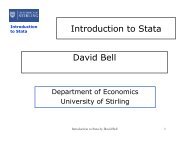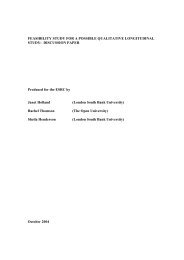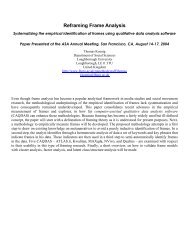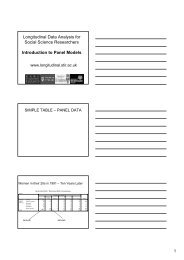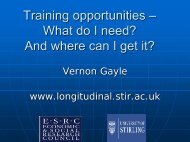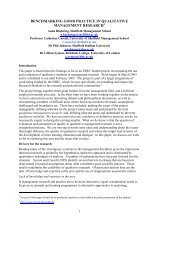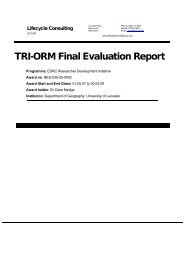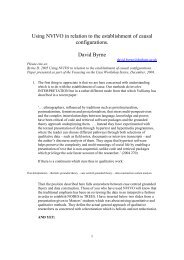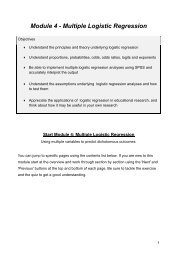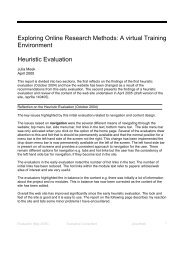Benchmarking Good Practice in Qualitative Management Research ...
Benchmarking Good Practice in Qualitative Management Research ...
Benchmarking Good Practice in Qualitative Management Research ...
You also want an ePaper? Increase the reach of your titles
YUMPU automatically turns print PDFs into web optimized ePapers that Google loves.
<strong>Benchmark<strong>in</strong>g</strong> <strong>Good</strong> <strong>Practice</strong> <strong>in</strong><br />
<strong>Qualitative</strong> <strong>Management</strong> <strong>Research</strong>:<br />
The Facilitator’s Guide<br />
Prof. Cather<strong>in</strong>e Cassell,<br />
Dr Gillian Symon,<br />
Prof. Phil Johnson,<br />
Dr Victoria Bishop<br />
Anna Buehr<strong>in</strong>g.<br />
1
Contents<br />
Introduction and user <strong>in</strong>structions<br />
Workshop 1: Skills of the qualitative researcher<br />
Workshop 2: Philosophies that <strong>in</strong>form qualitative research<br />
Workshop 3: Reflexivity<br />
Workshop 4: Range of qualitative methods<br />
Workshop 5: <strong>Qualitative</strong> analysis<br />
Workshop 6: <strong>Qualitative</strong> writ<strong>in</strong>g and publish<strong>in</strong>g skills<br />
Workshop 7: Assessment criteria<br />
Workshop 8: Review<strong>in</strong>g qualitative papers and research grants<br />
Workshop 9: Supervision for qualitative research<br />
2
Introduction<br />
As part of the ESRC project entitled ‘<strong>Benchmark<strong>in</strong>g</strong> <strong>Good</strong> <strong>Practice</strong> <strong>in</strong> <strong>Qualitative</strong><br />
<strong>Management</strong> <strong>Research</strong>’ (Grant number H333250006) we have designed a series<br />
of workshops aimed at address<strong>in</strong>g the tra<strong>in</strong><strong>in</strong>g needs that people have <strong>in</strong> this<br />
field. This handbook is <strong>in</strong>tended to serve as a guide to these workshops, enabl<strong>in</strong>g<br />
<strong>in</strong>dividuals to successfully and effectively carry them out.<br />
Background to the Workshops<br />
The aims of the ESRC project were to:<br />
• Conduct a systematic <strong>in</strong>vestigation <strong>in</strong>to current perceptions of qualitative<br />
methods <strong>in</strong> management research, <strong>in</strong>clud<strong>in</strong>g perceived barriers to their<br />
use;<br />
• Identify perceptions of good practice <strong>in</strong> conduct<strong>in</strong>g qualitative<br />
management research;<br />
• Ascerta<strong>in</strong> perceptions of skill deficits <strong>in</strong> this area and the factors viewed as<br />
contribut<strong>in</strong>g to these deficits;<br />
• Develop materials and workshops to encourage <strong>in</strong>formed and reflexive<br />
practice <strong>in</strong> qualitative management research;<br />
• Develop appropriate, specific and accessible sets of criteria for assess<strong>in</strong>g<br />
qualitative management research.<br />
This project drew upon 45 semi-structured <strong>in</strong>terviews with four different<br />
stakeholder groups. These were<br />
• ‘Epistemological gatekeepers’ (eg: journal editors and funders of<br />
qualitative research);<br />
• <strong>Research</strong> practitioners us<strong>in</strong>g qualitative research;<br />
• Doctoral programme leaders;<br />
• <strong>Qualitative</strong> researchers.<br />
While the structure of these <strong>in</strong>terviews did vary somewhat accord<strong>in</strong>g to panel<br />
membership, generally these <strong>in</strong>terviews focused on the follow<strong>in</strong>g questions:<br />
• Def<strong>in</strong>itions of qualitative management research;<br />
• Perceived problems <strong>in</strong> conduct<strong>in</strong>g and dissem<strong>in</strong>at<strong>in</strong>g such research;<br />
• Perceptions of good practice <strong>in</strong> undertak<strong>in</strong>g qualitative management<br />
research;<br />
• Beliefs about appropriate assessment criteria for evaluat<strong>in</strong>g such<br />
research;<br />
• Perceptions of skill deficits <strong>in</strong> this area and the factors viewed as<br />
contribut<strong>in</strong>g to such deficits;<br />
3
• Perceived tra<strong>in</strong><strong>in</strong>g needs.<br />
All <strong>in</strong>terviews were tape recorded and transcribed for analysis. Given the size of<br />
the dataset, the qualitative data analysis package N-Vivo was used to enable<br />
effective data management. The analytic process adopted largely followed the<br />
conventions of template analysis (K<strong>in</strong>g, 2004). For further <strong>in</strong>formation on this<br />
project, please see the report ‘<strong>Benchmark<strong>in</strong>g</strong> <strong>Good</strong> <strong>Practice</strong> <strong>in</strong> <strong>Qualitative</strong><br />
<strong>Management</strong> <strong>Research</strong>’.>><br />
Tra<strong>in</strong><strong>in</strong>g Needs Identified <strong>in</strong> <strong>Qualitative</strong> <strong>Research</strong><br />
One of the key aims of the research was to identify the perceived skill deficits <strong>in</strong><br />
the area of qualitative management research and to highlight what is needed to<br />
improve the situation. Interviewees identified a number of potential areas for<br />
tra<strong>in</strong><strong>in</strong>g (See Table 1). Firstly, there was perceived to be a need for tra<strong>in</strong><strong>in</strong>g <strong>in</strong><br />
certa<strong>in</strong> technical skills, <strong>in</strong>clud<strong>in</strong>g data collection, analysis, writ<strong>in</strong>g and review<strong>in</strong>g<br />
as well as general awareness of the complex skills required <strong>in</strong> qualitative<br />
research. Secondly, it was felt that additional tra<strong>in</strong><strong>in</strong>g was required <strong>in</strong> certa<strong>in</strong><br />
philosophical issues, specifically tra<strong>in</strong><strong>in</strong>g <strong>in</strong> a range of philosophical approaches<br />
as well as tra<strong>in</strong><strong>in</strong>g <strong>in</strong> assessment criteria and the differ<strong>in</strong>g philosophical<br />
assumptions which underp<strong>in</strong> them. Lastly more general tra<strong>in</strong><strong>in</strong>g issues were<br />
flagged up such as the need for extra tra<strong>in</strong><strong>in</strong>g <strong>in</strong> various areas for PhD students,<br />
post-doc and more <strong>in</strong>experienced researchers, established researchers, the<br />
practitioner community and supervisors of qualitative research. We designed<br />
these tra<strong>in</strong><strong>in</strong>g workshops directly <strong>in</strong> response to these needs. Therefore we did<br />
not aim to cover all of the tra<strong>in</strong><strong>in</strong>g needs with<strong>in</strong> the field of qualitative<br />
management research but just to respond to those needs identified by this broad<br />
range of <strong>in</strong>terviewees. Subsequent pilot<strong>in</strong>g of the tra<strong>in</strong><strong>in</strong>g workshops has<br />
demonstrated that there is a demand for tra<strong>in</strong><strong>in</strong>g to meet the needs identified<br />
through this project.<br />
How to use the Facilitator’s Guide<br />
The facilitator’s guide is designed to serve as a handbook for these workshops.<br />
The guide is based around the workshop slides but has additional comments<br />
which are aimed at help<strong>in</strong>g the <strong>in</strong>dividual to successfully carry out the workshop<br />
and to talk competently about the issues raised. These notes take the form of a<br />
commentary on issues raised along-side suggestions for prior read<strong>in</strong>g both with<br />
regards to the literature and the other workshops. Additionally these notes offer<br />
guidance on how to carry out the workshop exercises. Where prior read<strong>in</strong>g is<br />
required by the facilitator or the attendees this is <strong>in</strong>dicated.<br />
The workshops have been designed us<strong>in</strong>g a modular structure to enable a ‘mix<br />
and match’ approach to be used. Individuals do not need to study the <strong>in</strong>dividual<br />
workshops <strong>in</strong> the order set out but can select those which they feel are of most<br />
4
elevance. Most of the workshops are designed to be used as either part of a<br />
course or else as a stand alone session. However, a few of the workshops do<br />
require participants to familiarise themselves with other workshops prior to<br />
attend<strong>in</strong>g. An electronic version of the workshop slides can be found on this<br />
website.<br />
5
The workshops all have a uniform structure which consists of :<br />
• Identification of the tra<strong>in</strong><strong>in</strong>g need<br />
• Workshop aims<br />
• Workshop objectives<br />
• Outl<strong>in</strong>e of the workshop<br />
• Substantive content<br />
• Exercises<br />
• Conclusions<br />
• Further sources<br />
There is a space on our this website for feedback on the tra<strong>in</strong><strong>in</strong>g workshops.<br />
Please use it to record any feedback <strong>in</strong>clud<strong>in</strong>g modifications/ adaptations made<br />
to the orig<strong>in</strong>al workshops.<br />
6
Table 1: <strong>Benchmark<strong>in</strong>g</strong> <strong>Qualitative</strong> <strong>Management</strong> <strong>Research</strong>: Tra<strong>in</strong><strong>in</strong>g Needs and Workshops<br />
Workshop Tra<strong>in</strong><strong>in</strong>g Requirement Objective Content Relevant Groups<br />
1. Skills of the qualitative<br />
researcher >><br />
2. Philosophies that<br />
<strong>in</strong>form qualitative<br />
research >><br />
Derived from<br />
respondents’ comments<br />
that the skills of the<br />
qualitative researcher are<br />
generally<br />
underestimated. Also it<br />
was suggested that new<br />
researchers th<strong>in</strong>k it’s an<br />
easy option when they<br />
are lack<strong>in</strong>g statistics<br />
confidence.<br />
Derived from comments<br />
about the need for<br />
awareness of different<br />
approaches and their<br />
impact on methodology<br />
3. Reflexivity >> Derived from comments<br />
about the need to reflect<br />
on own practice and<br />
research <strong>in</strong> general.<br />
Gives fledgl<strong>in</strong>g<br />
researchers and those<br />
who judge qualitative<br />
research the idea that<br />
qualitative research is<br />
more complex than often<br />
assumed.<br />
Helps to <strong>in</strong>crease<br />
understand<strong>in</strong>g of the<br />
differences between<br />
methods and their<br />
underly<strong>in</strong>g<br />
epistemological and<br />
ontological commitments.<br />
To encourage critical<br />
appraisal of own<br />
research practices and<br />
more thoughtful research<br />
design and analysis.<br />
Explores a variety of<br />
qualitative research skills<br />
and suggests how they<br />
could be learnt.<br />
Signposts further<br />
sources <strong>in</strong> this area.<br />
Overview of underly<strong>in</strong>g<br />
philosophies<br />
Signposts further<br />
sources <strong>in</strong> this area.<br />
Explores different<br />
aspects of reflexivity.<br />
Signposts further<br />
sources <strong>in</strong> this area.<br />
PhD students<br />
Policy makers<br />
<strong>Research</strong>ers<br />
PhD students<br />
<strong>Research</strong>ers<br />
PhD students<br />
7
Workshop Title Tra<strong>in</strong><strong>in</strong>g Requirement Objective Content Relevant Groups<br />
4. Range of <strong>Qualitative</strong><br />
Methods >><br />
5. <strong>Qualitative</strong> analysis<br />
(<strong>in</strong>c software) >><br />
6. <strong>Qualitative</strong> writ<strong>in</strong>g and<br />
publish<strong>in</strong>g skills >><br />
Derived from comments<br />
about qualitative<br />
researchers stay<strong>in</strong>g with<br />
the methods they know<br />
best and seem<strong>in</strong>gly<br />
unaware of other<br />
approaches.<br />
Derived from comments<br />
that this seems the least<br />
developed of all<br />
qualitative research skills<br />
and under reported <strong>in</strong> the<br />
literature<br />
Derived from comments<br />
about both the<br />
importance of engag<strong>in</strong>g<br />
readers <strong>in</strong> writ<strong>in</strong>g and<br />
also the difficulties of<br />
writ<strong>in</strong>g qualitative<br />
research. This workshop<br />
is also a reaction to the<br />
dearth of qualitative<br />
research currently<br />
published <strong>in</strong> some areas.<br />
Give researchers a better<br />
idea of the variety of<br />
methods available and<br />
<strong>in</strong>sights possible. May<br />
lead to more diverse<br />
ways of address<strong>in</strong>g<br />
contemporary theoretical<br />
and practical issues.<br />
Provides some <strong>in</strong>dication<br />
of how qualitative data<br />
analysis may be<br />
conducted and different<br />
assumptions and<br />
approaches possible.<br />
Encourages the<br />
publication of qualitative<br />
research.<br />
.<br />
Overview of range of<br />
qualitative methods.<br />
Lists further sources for<br />
specific methods<br />
Demonstrates actual<br />
analysis techniques<br />
us<strong>in</strong>g step by step<br />
exercises on data<br />
extracts.<br />
Explores the use of<br />
computer software.<br />
Signposts further<br />
sources for qualitative<br />
analysis <strong>in</strong>c analysis<br />
software<br />
Exam<strong>in</strong>es aspects of<br />
skilful and engag<strong>in</strong>g<br />
writ<strong>in</strong>g.<br />
Explores publish<strong>in</strong>g<br />
considerations for<br />
qualitative research.<br />
Signposts further<br />
sources <strong>in</strong> this area.<br />
<strong>Research</strong>ers<br />
PhD students<br />
Policy makers<br />
<strong>Research</strong>ers<br />
PhD students<br />
<strong>Research</strong>ers<br />
PhD Students<br />
Directors/Supervisors<br />
Journal Editors<br />
Review Boards<br />
8
Workshop Title Tra<strong>in</strong><strong>in</strong>g Requirement Objective Content Relevant Groups<br />
7. Assessment Criteria<br />
>><br />
Derived from comments<br />
about the application of<br />
<strong>in</strong>appropriate criteria and<br />
concerns about how to<br />
assess qualitative<br />
research.<br />
To demonstrate that<br />
different assessment<br />
criteria appropriate for<br />
different k<strong>in</strong>ds of<br />
research. Provide<br />
criteria to enable<br />
cont<strong>in</strong>gent assessments.<br />
Explores different<br />
assessment criteria and<br />
their underly<strong>in</strong>g<br />
philosophical<br />
assumptions.<br />
Signposts further<br />
sources <strong>in</strong> this area.<br />
<strong>Research</strong>ers<br />
PhD students and<br />
Directors/Supervisors<br />
Journal Editors and<br />
Review Boards<br />
8. Review<strong>in</strong>g <strong>Qualitative</strong><br />
Papers and <strong>Research</strong><br />
Grants >><br />
Derived from comments<br />
about the application of<br />
<strong>in</strong>appropriate criteria and<br />
concerns about how to<br />
assess qualitative<br />
research.<br />
Also responds to<br />
comments about<br />
<strong>in</strong>adequacy of tra<strong>in</strong><strong>in</strong>g of<br />
many reviewers.<br />
Encourage the<br />
publication of qualitative<br />
research through<br />
chang<strong>in</strong>g editors and<br />
reviewers’ perceptions of<br />
the value of qualitative<br />
work. Apply<strong>in</strong>g the<br />
cont<strong>in</strong>gent assessment<br />
criteria to a specific and<br />
tangible issue. Provide<br />
some guidel<strong>in</strong>es for<br />
competent review<strong>in</strong>g.<br />
The application of<br />
different assessment<br />
criteria. Considers the<br />
skills needed for effective<br />
review<strong>in</strong>g.<br />
Journal Editors<br />
Review Boards<br />
<strong>Research</strong>ers<br />
9. Supervision for<br />
<strong>Qualitative</strong> <strong>Research</strong> >><br />
Derived from perception<br />
that <strong>in</strong>sufficient expertise<br />
amongst potential<br />
supervisors <strong>in</strong> this area.<br />
Improve the supervision<br />
of qualitative PhD<br />
students and overcome<br />
potential feel<strong>in</strong>gs of<br />
isolation (students and<br />
supervisors).<br />
Particular difficulties that<br />
may face qualitative PhD<br />
students and how these<br />
might be overcome.<br />
Network<strong>in</strong>g.<br />
Advice on resources and<br />
discussion groups etc<br />
PhD<br />
Directors/Supervisors<br />
9



